Mick Lowe’s The Raids – Review
Volume 1 of the Nickel Range Trilogy
By Jeremy Hespeler-Boultbee *
Asked to review Mick Lowe’s new book, The Raids, I have taken the time out to go over it a second time. I have known Mick as a friend since the days in 1975/76 when the two of us were reporting on the so-called “Carnation Revolution” in Lisbon, Portugal; he was a meticulous journalist then, and he is a meticulous writer now.
For all that his venue has changed in the intervening years, Mick writes like a pro, putting his story together piece-by-piece in the way a good newsman assaults any series of stirring events. The Raids is the first thrilling portion of a Canadian saga – The Nickel Range Trilogy – set, of all unlikely places, in Sudbury, Ontario. Which is Mick Lowe’s very clever and precise point: tough, outback working Canada, little known to Canadians for anything more than its gigantic smelter smokestack and the mountains of mining slag that seem to engulf an unappealing grey town.
In recent years Sudbury has been transformed. It is a well-ordered garden city now that the operating methods of the mines have themselves been significantly transformed – a great deal of which Mick Lowe describes in fascinating detail as he builds the story line of a mining family.
There is a strong socio-political element to the story – events of Mick Lowe’s fertile imagination, but events that only slightly push the boundary of a reality that actually existed well within the lifetimes of current Sudbury residents – and which persist almost everywhere else to this very day in areas where there are determined and greedy bosses, and desperately determined workers.
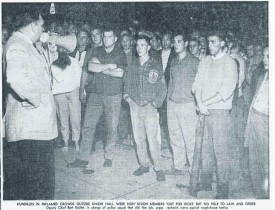
Sudbury Star, August 28, 1961 – Siege of Mine Mill Hall
Anyone who has spent time in this fascinating corner of Canada’s northern Ontario – or any other mining town in the country – will be able to identify with The Raids’ plot and story line, but the book is far more than the usual pedantic regional tale so many Canadians feel beholden to lap. It goes to the heart of the tensions so often consciously built to maintain a worker-management tension – an imbalance almost tailor-made to pander to friction. It portrays on a minuscule (but understandable) scale, the old “divide-and-conquer” rule used by so many grasping “colonizers” that makes it easy to see and measure – money, local power elites and the desperation of the job-related eagerness of men and women who, in order to maintain their own short-sighted equilibrium, instead bolster the absentee landlord and his fat bank account.
The Raids is quite a tale – well told, and with more to come. It is a far cry from so much of Canada’s literary parochialism, a book that successfully aspires to contribute to a genuine and important Canadian – and universal – dialog.
* Jeremy Hespeler-Boultbee is a writer, journalist, and architectural historian. He considers home to be Victoria BC, Canada, Barrancos, Portugal, and Bahir Dar, Ethiopia. His most recent book is Mrs. Queen’s Chump, CCB Publishing, 2012.
Buy The Raids here.
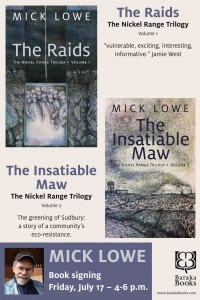 Mick Lowe’s first two books in The Nickel Range Trilogy, The Raids and The Insatiable Maw are now on sale at the Sudbury Costco. Mick will also be signing books at the store on Friday, July 17 from 4 to 6 p.m. People from all points in Northern Ontario who stock up at the Sudbury Costco can now also stock up on great stories by a guy who has spent his life writing them.
Mick Lowe’s first two books in The Nickel Range Trilogy, The Raids and The Insatiable Maw are now on sale at the Sudbury Costco. Mick will also be signing books at the store on Friday, July 17 from 4 to 6 p.m. People from all points in Northern Ontario who stock up at the Sudbury Costco can now also stock up on great stories by a guy who has spent his life writing them.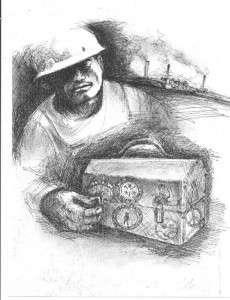

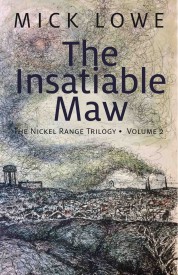

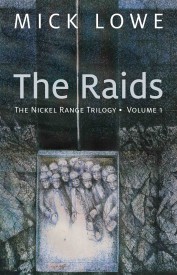 “All good stories have some element of conflict to create drama and this town [Sudbury] was absolutely convulsed with conflict at this time. The story opens with our protagonist Jake McCool, who is nineteen going underground for his shift at the Garson Mine. He comes from an old Mine Mill family and he becomes embroiled in the raids between Steelworkers and the Mine Mill Union almost against his own will but it happens (…) and he has a girlfriend named Jo Ann; there’s a romance, a love story as well a split, against the backdrop of the struggle between the Steelworkers and the Mine Mill which is really just the localized version of a global struggle in the cold war between communist ideology and imperialist. … I see it as story that really has never been told.”
“All good stories have some element of conflict to create drama and this town [Sudbury] was absolutely convulsed with conflict at this time. The story opens with our protagonist Jake McCool, who is nineteen going underground for his shift at the Garson Mine. He comes from an old Mine Mill family and he becomes embroiled in the raids between Steelworkers and the Mine Mill Union almost against his own will but it happens (…) and he has a girlfriend named Jo Ann; there’s a romance, a love story as well a split, against the backdrop of the struggle between the Steelworkers and the Mine Mill which is really just the localized version of a global struggle in the cold war between communist ideology and imperialist. … I see it as story that really has never been told.” Mick Lowe will launch The Raids on Sunday, May 25 at 2 p.m. at the Steelworkers Hall in Sudbury. He will be available for book signings at the official launch. USWA 6500, 66 Brady Street, Sudbury.
Mick Lowe will launch The Raids on Sunday, May 25 at 2 p.m. at the Steelworkers Hall in Sudbury. He will be available for book signings at the official launch. USWA 6500, 66 Brady Street, Sudbury.

Facebook